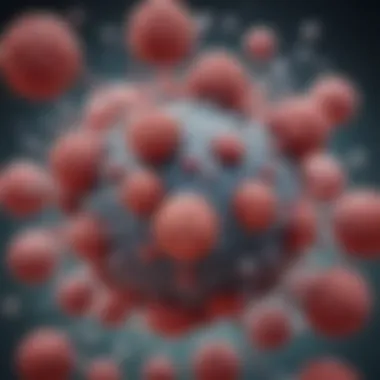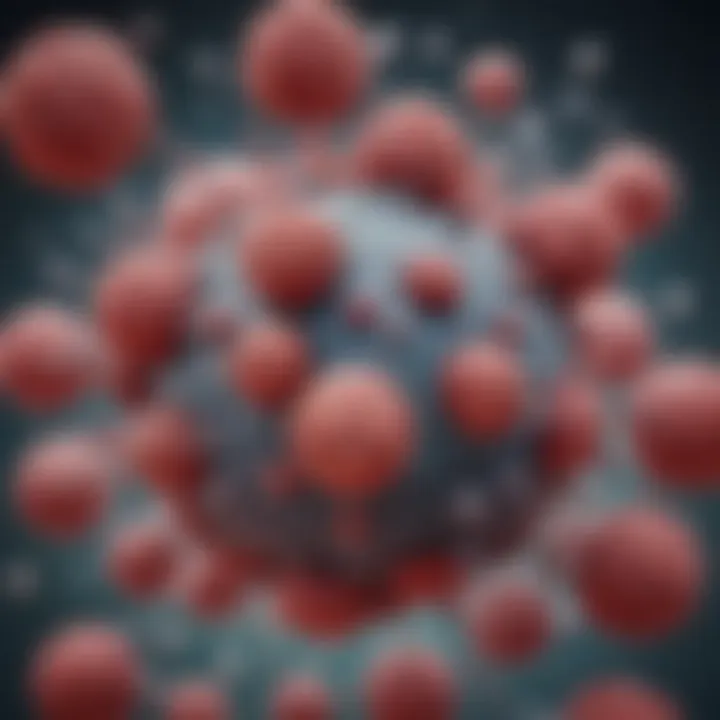Nivolumab's Role in Hepatocellular Carcinoma Treatment


Intro
Nivolumab has emerged as a significant player in the treatment of hepatocellular carcinoma (HCC), which is the most common form of liver cancer. Understanding its role requires a detailed examination of how this drug works, its effectiveness in clinical settings, and the challenges that lie ahead. This article investigates the mechanisms of action of nivolumab, its efficacy in HCC treatment, resistance issues, and future directions in therapeutic regimens.
Research Highlights
Key Findings
Nivolumab is a programmed death-1 (PD-1) receptor antagonist. This means it helps to mitigate the immune evasion strategies employed by cancer cells. Some key findings include:
- Immunotherapy Impact: Data shows that nivolumab can significantly improve overall survival rates in patients with advanced HCC who have previously undergone systemic therapy.
- Durable Responses: The drug is associated with durable responses in a subset of patients, suggesting potential long-term benefits when used correctly.
- Biomarkers for Efficacy: Ongoing research seeks to identify biomarkers that predict response to nivolumab, which may help tailor treatment to individual patients.
- Combination Therapy: Preliminary studies indicate that combining nivolumab with other therapies, such as axitinib, may enhance therapeutic efficacy beyond what either agent achieves alone.
Implications and Applications
The implications of using nivolumab in HCC treatment are profound:
- Personalized Medicine: There is potential for personalized treatment plans based on individual tumor biology and patient factors.
- Standard of Care: With further validation, nivolumab may become part of the standard care protocol for HCC, especially in patients who do not respond to conventional therapies.
- Broader Oncological Impact: The use of nivolumab exemplifies a broader shift in cancer treatment modalities towards immunotherapeutic approaches, potentially influencing other cancer treatments as well.
"The introduction of nivolumab represents a paradigm shift in how we approach hepatocellular carcinoma treatment, with implications that extend far beyond this specific cancer."
Methodology Overview
Research Design
Most studies investigating nivolumab for HCC employ a multi-faceted research design that includes both retrospective and prospective analyses of clinical trial data. The focus is on evaluating treatment outcomes, identifying adverse effects, and exploring the broader implications of its use in clinical practice.
Experimental Procedures
Typical experimental procedures involve enrolling patients with advanced HCC, administering nivolumab based on clinical criteria, and assessing outcomes through regular follow-ups. These outcomes are measured using various clinical endpoints such as overall survival, progression-free survival, and objective response rates.
Furthermore, efforts are made to collect tissue samples pre and post-treatment to investigate changes in tumor microenvironment and identify any biomarkers associated with treatment effectiveness.
Preface to Hepatocellular Carcinoma
Hepatocellular carcinoma (HCC) has emerged as a significant focus in oncology due to its rising incidence and the challenges associated with its treatment. This introduction serves as a foundation for understanding the complexities of HCC and its implications within the broader context of cancer treatment methodologies. A comprehensive grasp of HCC not only aids researchers and medical professionals in crafting targeted therapies but also emphasizes the urgent need for elucidating its etiologies and treatment responses.
Overview of Hepatocellular Carcinoma
Hepatocellular carcinoma is the most common form of primary liver cancer, originating from hepatocytes, the primary cells of the liver. It is often associated with chronic liver disease, particularly cirrhosis caused by viral hepatitis or alcohol abuse. The disease typically presents at an advanced stage, making early diagnosis and effective treatment challenging. Symptoms can include weight loss, loss of appetite, and jaundice, which are often indicators of late-stage disease.
HCC has distinct pathological features and clinical behaviors compared to other malignancies. This tumor is known for its unique ability to invade surrounding tissues and metastasize to distant organs. Moreover, HCC cells exhibit various genetic mutations, contributing to their resilience against conventional therapies. Understanding the biology of HCC, including its progression and relationship with liver diseases, is essential for developing targeted immuno-oncology approaches such as nivolumab.
Epidemiology and Risk Factors
The epidemiological landscape of hepatocellular carcinoma reveals a stark global health concern. HCC prevalence varies significantly by geographic location, primarily influenced by liver disease burdens. In regions such as East Asia and Sub-Saharan Africa, hepatitis B virus (HBV) infection remains a major risk factor, while in Western countries, hepatitis C virus (HCV) infection and metabolic syndromes play a significant role.
Several key risk factors have been identified for HCC:
- Chronic viral infections: HBV and HCV are the leading causes of HCC worldwide.
- Cirrhosis: Most patients with HCC have underlying cirrhosis, regardless of its cause.
- Alcohol abuse: Prolonged heavy drinking contributes to liver disease and increases HCC risk.
- Metabolic conditions: Conditions like obesity and diabetes are becoming more recognized as risk factors for HCC.
Given these various risk factors, the need for targeted screenings in high-risk populations is imperative. Efforts toward improving early detection and understanding underlying mechanisms of HCC can enhance treatment outcomes.
"Understanding the epidemiology and risk factors of HCC is crucial in the global fight against liver cancer."
Overall, the introduction to hepatocellular carcinoma lays the groundwork for appreciating the role of nivolumab in its management, bridging the gap between understanding disease fundamentals and exploring therapeutic innovations.
Understanding Nivolumab
Nivolumab represents a significant advancement in treating hepatocellular carcinoma (HCC). It is an immune checkpoint inhibitor that enhances the body's immune response against cancer cells. Understanding the mechanisms and implications of nivolumab is crucial for appreciating its role in HCC therapy.
This section aims to elucidate characteristics that make nivolumab a vital component of cancer treatment. It underscores how elementss that underlie nivolumab's action can lead to better outcomes for patients with HCC. The implications touch on clinical efficacy and how nivolumab fits within a broader treatment landscape.
Mechanism of Action
Nivolumab works by targeting the programmed death-1 (PD-1) receptor, which is present on T cells. PD-1 acts as a regulatory checkpoint that inhibits T cell function. Tumor cells can exploit this pathway to escape from immune surveillance by expressing ligands such as PD-L1. When nivolumab binds to PD-1, it blocks this interaction, allowing T cells to effectively proliferate and attack cancer cells.
Comparative Analysis with Other Immunotherapies


When compared with other immunotherapies, nivolumab stands out for its unique pathway targeting. Other treatments such as ipilimumab focus on different immune checkpoints but have distinct mechanisms of action. Nivolumab is often discussed alongside pembrolizumab, another PD-1 inhibitor, which shares similar mechanisms but may differ in efficacy and safety profiles.
There is ongoing research to evaluate how nivolumab's combination with other therapies, like targeted agents or other immunotherapies, can offer enhanced benefits. The choice of therapy may depend on factors such as tumor characteristics and patient specifics.
In summary, understanding nivolumab's position among other treatments adds depth to the discussion of its use in HCC. This comparative analysis helps illuminate the strengths and weaknesses inherent in different therapeutic strategies.
Clinical Efficacy of Nivolumab in HCC
The clinical efficacy of nivolumab in the treatment of hepatocellular carcinoma (HCC) is a critical component of this discussion. Nivolumab is an immune checkpoint inhibitor that works by blocking the PD-1 pathway, thus enhancing the immune system's ability to target and destroy cancer cells. This section will analyze key clinical trials, response rates, and overall outcomes associated with nivolumab's use in HCC. Understanding the efficacy of nivolumab is important for assessing its role in improving patient outcomes in this challenging disease.
Key Clinical Trials
Several pivotal clinical trials have investigated the effectiveness of nivolumab in treating HCC. One of the most significant studies is the CheckMate 040 trial, which aimed to evaluate the safety and efficacy of nivolumab for patients with advanced HCC who had previously received treatment. The results demonstrated a notable objective response rate of approximately 20–25%. Furthermore, the trial reported that among those who responded, the duration of response was considerable, with some patients experiencing prolonged benefits from treatment. These findings establish nivolumab as a viable treatment option in advanced HCC, especially for patients who are not candidates for surgical procedures.
Another crucial trial is the CheckMate 459 trial. This study compared nivolumab to the standard treatment with sorafenib in patients with unresectable HCC. Although the primary endpoint of overall survival was not met, there were indications that nivolumab offered improved response rates and a more favorable safety profile compared to sorafenib, thus raising important considerations regarding its use in clinical settings.
Response Rates and Outcomes
The response rates associated with nivolumab in the context of HCC vary across different studies but generally indicate encouraging results. In patients with advanced HCC, the overall response rate ranges from 15% to 30%, depending on factors like prior treatment history and the stage of cancer at the time of treatment.
Notably, response rates are often correlated with the tumor's PD-L1 expression. Higher levels of PD-L1 expression in tumors typically associate with better outcomes following nivolumab treatment. This highlights the potential for biomarkers to guide personalized treatment approaches, allowing clinicians to select patients who are more likely to benefit from nivolumab.
In terms of overall survival, nivolumab has shown promise as well. Some studies suggest that patients treated with nivolumab tend to have a longer survival time compared to those receiving conventional therapies. However, it is critical to note that while nivolumab offers significant benefits, the measure of overall survival often requires longer follow-up periods to draw definitive conclusions.
In summary, the clinical efficacy of nivolumab in HCC underscores its potential improvements in treatment outcomes for patients with this challenging disease. The key trials highlight the importance of response rates and suggest an avenue for personalized therapy based on tumor characteristics.
Adverse Effects of Nivolumab
The discussion around nivolumab enhances our understanding of its role in treating hepatocellular carcinoma (HCC). Knowing the adverse effects is crucial for multiple stakeholders, including patients, clinicians, and researchers. As with any therapy, awareness of the medication’s side effects can influence treatment decisions and ultimately affect patient outcomes. This section emphasizes the significance of recognizing and managing these adverse effects to improve safety and effectiveness in HCC management using nivolumab.
Common Adverse Reactions
Patients receiving nivolumab may experience several common adverse reactions that can vary in severity. Understanding these reactions is essential to inform patients and adjust treatment as needed. Some typical adverse effects include:
- Fatigue: Many patients report significant fatigue, which can impact their quality of life.
- Rash: Skin reactions can be common, presenting as rashes or pruritus.
- Diarrhea: Gastrointestinal disturbances, such as diarrhea, may occur and can be serious if not monitored.
- Nausea: A feeling of nausea might be present, affecting dietary intake and overall well-being.
- Endocrinopathies: Conditions affecting hormone production, such as thyroiditis, adrenalitis or diabetes. These can lead to complications requiring careful management.
The understanding and monitoring of adverse effects are critical to ensuring safe nivolumab therapy in HCC patients.
Management of Adverse Effects
Effective management of adverse effects helps in maintaining patient adherence to nivolumab therapy and enhancing overall treatment outcomes. Several strategies can be employed:
- Regular Monitoring: Routine evaluations are necessary to identify adverse effects early. This includes blood tests and physical assessments tailored to nivolumab therapy.
- Patient Education: Informing patients about possible side effects allows them to report symptoms promptly. This proactive approach can lead to quicker interventions.
- Dose Adjustment: In cases where adverse effects are severe, adjusting the dose may be an option. This requires careful consideration and should only be done under the guidance of a healthcare provider.
- Corticosteroids: For serious immune-mediated reactions, such as pneumonitis or severe rashes, corticosteroids are often used to mitigate symptoms effectively.
- Interdisciplinary Support: Involving other healthcare professionals, such as dietitians and endocrinologists, can aid in addressing specific adverse effects effectively.
In summary, recognizing the common adverse reactions of nivolumab and implementing appropriate management strategies are both vital facets of improving the therapeutic experience and outcomes for patients with hepatocellular carcinoma.
Resistant Mechanisms in Hepatocellular Carcinoma
Understanding resistant mechanisms in hepatocellular carcinoma (HCC) is crucial to optimize treatment with nivolumab. HCC, being a complex and heterogeneous disease, poses significant challenges to immunotherapies. Resistance can lead to treatment failure, necessitating a comprehensive grasp of its underpinnings.
By identifying the pathways and mechanisms of resistance, clinicians can devise strategic interventions that enhance the efficacy of nivolumab. This section discusses the pathways contributing to resistance and strategies to overcome them.
Pathways Contributing to Resistance
Resistance mechanisms can be categorized into intrinsic and extrinsic factors.
Intrinsic factors might include:
- Genetic Mutations: Mutations within the cancer cells can alter signaling pathways that are key to immune responses.
- Tumor Microenvironment: A suppressive microenvironment can inhibit effective anti-tumor activity. Various cells in the microenvironment may promote immune evasion.
Extrinsic factors include:
- Immune Suppressor Cells: Regulatory T-cells (Tregs) and myeloid-derived suppressor cells (MDSCs) can create an immune-dampening effect, limiting the activity of immune checkpoint inhibitors like nivolumab.
- Checkpoints Beyond PD-1: Other pathways, such as CTLA-4 or LAG-3, may inhibit T-cell activation even when PD-1 is blocked.
These pathways can create a barrier that limits nivolumab's effectiveness. Investigating these factors aids researchers and healthcare providers in understanding treatment failures in HCC.
Strategies to Overcome Resistance


Addressing resistance is essential for improving patient outcomes. Here are several strategies:
- Combination Therapies: Merging nivolumab with other immunotherapies or targeted agents can counteract resistance. For example, using anti-CTLA-4 along with nivolumab may yield better results.
- Targeted Therapies: Utilizing drugs that specifically inhibit the identified mutations or pathways that contribute to resistance can restore sensitivity to nivolumab.
- Modifying the Tumor Microenvironment: Techniques aimed at reshaping the tumor's microenvironment, like depleting MDSCs or reprogramming Tregs, can enhance immune response.
"By addressing the roots of resistance, we enhance the potential for nivolumab to produce durable responses in patients suffering from HCC."
Continuous research is imperative. Identifying new biomarkers for resistance will allow for better patient stratification and more tailored therapeutic approaches.
Understanding resistance ultimately informs clinicians in making more effective treatment decisions, paving the way for better management of HCC.
Combination Therapies Involving Nivolumab
Combination therapies in the context of nivolumab applications for hepatocellular carcinoma (HCC) represent a critical area of exploration. The ever-expanding landscape of cancer treatment necessitates innovative strategies to enhance therapeutic efficacy, and nivolumab, as a powerful immune checkpoint inhibitor, offers promising avenues when combined with other treatment modalities. This section delves deeper into the rationale for combination approaches and reviews current clinical studies focused on these methods.
Rationale for Combination Therapy
The primary aim of combined treatment is to tackle the intricate biology of HCC, which often exhibits significant heterogeneity. Monotherapies may not be sufficient to achieve optimal responses. Thus, integrating nivolumab with other drugs can potentially exploit various mechanisms of action, aiming to improve outcomes such as progression-free survival and overall patient prognosis.
There exists a strong foundation rooted in clinical evidence suggesting that combining nivolumab with other agents, such as targeted therapies or other immunotherapies, can provide a synergistic effect. For instance:
- Enhanced Immune Response: When nivolumab is paired with agents that stimulate the immune system, it can enhance T-cell activation and proliferation.
- Direct Cytotoxic Effects: Additionally, some therapies may directly induce apoptosis in cancer cells, complementing the immuno-oncological approach.
- Overcoming Resistance: With the emergence of resistant clones in HCC, leveraging combination strategies could help in targeting multiple pathways simultaneously and reducing the likelihood of resistance.
Current Clinical Trials and Studies
Numerous clinical trials currently investigate the efficacy of nivolumab in combination with other treatments for HCC. These studies are paramount in understanding the potential advantages of these combination therapies. A few notable trials include:
- NCT02827867 (CheckMate 040): This trial examines nivolumab with ipilimumab, focusing on tolerability and objective response rates in patients with advanced hepatocellular carcinoma.
- NCT03430843: Investigating the combination of nivolumab and lenvatinib, this study evaluates the outcomes concerning survivability and safety in HCC cases.
- NCT03769257: This trial studies nivolumab in conjunction with other systemic treatments and is designed to assess the long-term benefits and quality of life improvements among participants.
The ongoing results and insights from these trials are instrumental in shaping future guidelines for effective HCC management. Given the complexity of liver cancer, these studies contribute valuable data that inform best practices.
"Combination therapies involving nivolumab have the potential to redefine treatment paradigms in HCC, offering hope for improved patient outcomes."
Long-Term Outcomes with Nivolumab
Understanding the long-term outcomes associated with nivolumab in treating hepatocellular carcinoma (HCC) is crucial for evaluating the drug's overall efficacy and safety profile. This topic is significant because it not only highlights the potential for sustained remission in patients but also explores the implications of long-term use on health resources and patient management.
Survival Benefits
Survival benefits of nivolumab are a primary concern in clinical research and patient care. Several studies indicate that patients receiving nivolumab tend to have improved overall survival rates compared to those undergoing standard therapies. This is particularly important in HCC, where the prognosis is often grim.
Clinical trials, such as CheckMate-040, have demonstrated that nivolumab offers a notable survival advantage. In this study, it was found that the one-year survival rate for patients treated with nivolumab was significantly higher than those treated with traditional therapies. Factors such as tumor burden and liver function play a critical role in these outcomes. For instance, better liver function often correlates with improved survival rates.
Moreover, nivolumab's ability to create durable responses in some patients contributes to its long-term benefits. A subset of individuals experience long-lasting remission, which can lead to a better quality of life and reduced need for further aggressive treatments.
Quality of Life Considerations
Quality of life is an essential aspect of any cancer treatment regimen. Nivolumab appears to have a favorable impact on the quality of life for many patients with HCC. As immunotherapy focuses on restoring the immune response rather than direct damage to cancer cells, many patients report fewer debilitating side effects compared to traditional chemotherapy.
Patients often experience less fatigue and nausea, leading to an improved sense of well-being. Regular monitoring in clinical trials has allowed for assessments of quality of life as part of survivorship studies. In these assessments, nivolumab has shown the capacity to maintain or sometimes enhance quality of life benchmarks over the course of treatment.
In addition, mental health outcomes are also an area of interest. Patients on nivolumab report higher levels of optimism and lower anxiety related to their prognosis. This overall improvement in quality of life is invaluable, particularly in populations that experience significant health care-related stress. Patients not only seek extended survival but also a better life while undergoing treatment.
"The ultimate goal in treating HCC is not just to increase survival but to enhance the overall quality of life for patients."
Regulatory and Approval Status
The regulatory and approval status of nivolumab plays a significant role in its utilization for treating hepatocellular carcinoma (HCC). Understanding the pathways through which nivolumab receives endorsement from regulatory bodies can lead to better insights into its clinical application. This section will address critical elements of nivolumab’s regulatory journey and highlight the benefits and considerations that surround its approval.
FDA Approval for HCC
The approval of nivolumab by the U.S. Food and Drug Administration (FDA) marked a pivotal moment for patients suffering from HCC. In 2017, nivolumab was approved for the treatment of patients with advanced liver cancer who had previously been treated with sorafenib. This approval was based on data from clinical trials demonstrating its efficacy in improving overall survival rates compared to traditional therapies.
The FDA’s decision was not made lightly. It considered substantial evidence gathered from extensive studies, including the CheckMate 040 trial. In this trial, nivolumab showed a promising objective response rate, leading to significant interest in its use as a second-line treatment for HCC. The approval represents a critical step, providing oncologists with a new tool in the arsenal to combat liver cancer effectively.
Global Considerations and Approvals
While FDA approval is essential, nivolumab's acceptance on a global scale is equally important for its widespread use. Various countries have their own regulatory processes, which can affect the delivery of nivolumab to patients. For instance, the European Medicines Agency (EMA) also approved nivolumab for HCC, but the timelines and requirements for approval can vary significantly between regions.


Factors such as healthcare infrastructure, local treatment guidelines, and reimbursement policies can influence how nivolumab is integrated into treatment protocols in different countries. In some regions, access to nivolumab may still be limited, posing challenges for clinicians and patients.
In China, for example, local approval mechanisms have resulted in different timelines for nivolumab's availability compared to Western countries.
Understanding these global dynamics is essential for researchers and clinicians alike, as it sheds light on the challenges in making such treatments accessible worldwide.
The regulatory approval of nivolumab illustrates a significant strive toward enhancing treatment options for HCC, underscoring the importance of both local and global perspectives in drug deployment.
The ongoing assessments and re-evaluations by regulatory bodies ensure that nivolumab remains a feasible option for managing HCC as new evidence emerges. As more trials are conducted and data collected, the landscape of approvals may evolve, potentially expanding the eligibility for nivolumab in more patients with liver cancer.
Current Treatment Guidelines
Current treatment guidelines for hepatocellular carcinoma (HCC) are critical for establishing a unified approach in managing this complex disease. These guidelines facilitate healthcare professionals in making informed decisions regarding patient care, ensuring that all available options are considered. Nivolumab, an immune checkpoint inhibitor, plays an essential role within these guidelines, particularly for patients who have failed prior treatments or are in advanced stages of HCC.
Recommended Protocols for HCC
The recommended protocols for treating HCC emphasize a combination of established therapies and novel immunotherapies like nivolumab. Current guidelines focus on a patient-centered approach that takes into consideration individual health status, tumor characteristics, and prior treatment history.
- Liver Transplantation: This remains a curative option for selected patients with early-stage HCC, as it removes the tumor and the underlying cirrhotic liver.
- Resection: Surgical resection is advised for patients with adequate liver function and localized tumors. This option can be curative but is limited to specific candidates.
- Ablation Therapies: Techniques such as radiofrequency ablation (RFA) or microwave ablation are recommended for patients who are not candidates for surgery. They have shown efficacy in smaller tumors.
- Systemic Therapies: The introduction of drugs like nivolumab has reshaped the landscape of HCC management. Nivolumab is suggested for patients with advanced HCC who have experienced disease progression after prior systemic therapy. Guidelines recommend a careful evaluation of the patient's immune status and organ function before commencing treatment with nivolumab.
- Combination Therapies: Some protocols recommend the use of nivolumab in conjunction with other systemic agents, which may enhance the therapeutic response and address potential resistance mechanisms.
Role of Multidisciplinary Teams
The management of HCC necessitates a multidisciplinary approach involving hepatologists, oncologists, radiologists, and surgical specialists. Multidisciplinary teams (MDTs) play a pivotal role in coordinating care and formulating individualized treatment plans that leverage the expertise of various specialists. Involvement of different professionals ensures that all potential treatment modalities, including nivolumab, are carefully considered and integrated into the patient's care pathway.
The collaboration of these teams allows for:
- Holistic Patient Assessment: Each team member contributes to understanding the patient's overall condition, performance status, and treatment goals.
- Shared Decision-Making: Engaging patients in their treatment decisions fosters a sense of control and may enhance their commitment to the treatment plan.
- Optimized Resource Utilization: MDTs help streamline the treatment process, reducing delays, and improving the overall patient experience.
In summary, adherence to established treatment guidelines and the collaboration of multidisciplinary teams is essential for optimizing the management of HCC with nivolumab in line with the latest medical advancements.
Future Directions in HCC Research
Hepatocellular carcinoma (HCC) poses significant challenges in treatment and management. With the advent of nivolumab, a promising immune checkpoint inhibitor, focusing on future research directions is essential. This section highlights key aspects that future research should address, the benefits of innovative strategies, and considerations in ongoing studies.
Innovative Approaches to Treatment
Novel therapies are emerging to improve the outcomes for HCC patients. One area of focus is combining nivolumab with other agents. Recent studies suggest that combining nivolumab with targeted therapies such as sorafenib can enhance treatment effectiveness.
- Targeting Multiple Pathways: The cancer microenvironment in HCC is complex, often requiring multi-targeted approaches for effective management. By integrating nivolumab with angiogenesis inhibitors, researchers aim to tackle both immune evasion and oxygen deprivation in tumors.
- Adjuvant Therapies: Investigating the role of nivolumab in adjuvant settings may provide insights into its potential to prevent recurrence after liver resection or ablation. Early studies are underway to evaluate the impact of nivolumab when administered after surgical interventions.
- Personalized Immunotherapy: Identifying biomarkers that predict responses to nivolumab could refine patient selection for therapy. Utilizing genomic and proteomic technologies, researchers can tailor immunotherapy based on individual tumor characteristics, potentially improving efficacy and reducing adverse effects.
Potential Areas for Further Investigation
Ongoing research in HCC treatment not only aims to enhance the efficacy of nivolumab but also seeks to explore its limitations and potential improvements. Future investigations may include:
- Understanding Resistance Mechanisms: Continued study of the mechanisms that confer resistance to immune checkpoint inhibitors is crucial. Insights gained from understanding why some patients do not respond to nivolumab could lead to the development of complementary therapies, ultimately increasing the overall success rate of HCC treatment.
- Longitudinal Studies: Conducting long-term studies to evaluate the durability of responses and overall survival benefits in patients treated with nivolumab is needed. This will aid in clarifying how long the benefits last and what factors influence long-term outcomes.
- Impact on Quality of Life: Ongoing research should include assessments of how nivolumab and combinatory therapies impact the quality of life in patients with HCC. Patient-reported outcomes will provide valuable insights into the holistic efficacy of treatment protocols.
"Innovative research is a cornerstone for improving treatment paradigms in HCC, especially with the integration of immune checkpoint inhibitors like nivolumab."
In summary, as research progresses, the focus on innovative treatments and areas needing further exploration are vital to advance the management of HCC. Addressing these key points can lead to more effective strategies, ultimately improving patient outcomes.
Finale
The conclusion serves a critical role in synthesizing the information presented throughout this article on nivolumab and its role in hepatocellular carcinoma (HCC) treatment. In this section, the synthesis of key insights provides clarity for the reader. Nivolumab's mechanism as an immune checkpoint inhibitor is a significant advancement in oncology. It shifts how we approach treatment for HCC, a form of liver cancer that is notoriously difficult to treat.
One of the specific elements highlighted is the importance of understanding the clinical efficacy of nivolumab. This aspect not only shows viable treatment options but also presents a shift in patient management strategies. There is a clear trend indicating that introducing nivolumab can lead to improved outcomes for patients who previously had limited options.
Moreover, considerations about resistance mechanisms explored in prior sections reveal a layered understanding of both challenges and strategies that can be employed moving forward. Knowing how tumors evade immune responses is essential, as this lays the groundwork for potential therapeutic advancements. The insights into combination therapies also present exciting possibilities for enhancing treatment efficacy.
"Immunotherapy continues to redefine the landscape of cancer treatment, showcasing novel avenues that were once thought implausible."
Summary of Key Findings
In reviewing the key findings related to nivolumab, several critical points emerge:
- Nivolumab has demonstrated notable efficacy in patients with HCC, with clinical trials showing substantial response rates.
- The drug’s mechanism of action involves blocking PD-1, thereby enhancing the immune response against cancer cells.
- Adverse effects are present but generally manageable, allowing for a favorable balance of benefits and risks.
- Resistance mechanisms pose a challenge, yet understanding these can inform future treatment strategies.
- Combination therapies are being explored to potentially increase efficacy and provide more comprehensive care for patients.
These findings emphasize not only the promise of nivolumab in treating HCC but also the necessity for ongoing investigation into its mechanisms and impacts.
Implications for Future HCC Management
The future of hepatocellular carcinoma management is poised for transformation with the inclusion of nivolumab. The implications are multifaceted:
- Enhanced Treatment Protocols: As more data emerges, treatment guidelines can be refined to incorporate nivolumab more widely, especially in combination with other therapies.
- Patient-Centric Approaches: Understanding the variability in responses among patients facilitates tailored treatment plans that consider individual genetic profiles and tumor characteristics.
- Increased Research Focus: Ongoing clinical trials exploring combinations and new mechanisms are vital. Insights gained can lead to innovations in cancer therapy and improve outcomes for patients with limited options.
- Navigating Resistance: Future therapies will need to address not only how to effectively use nivolumab but also how to counteract resistance strategies that tumors adopt.
In summary, the landscape of HCC treatment is evolving. With nivolumab as a cornerstone in immune therapy, the potential to improve patient survival and quality of life underscores its importance within oncological practice.



